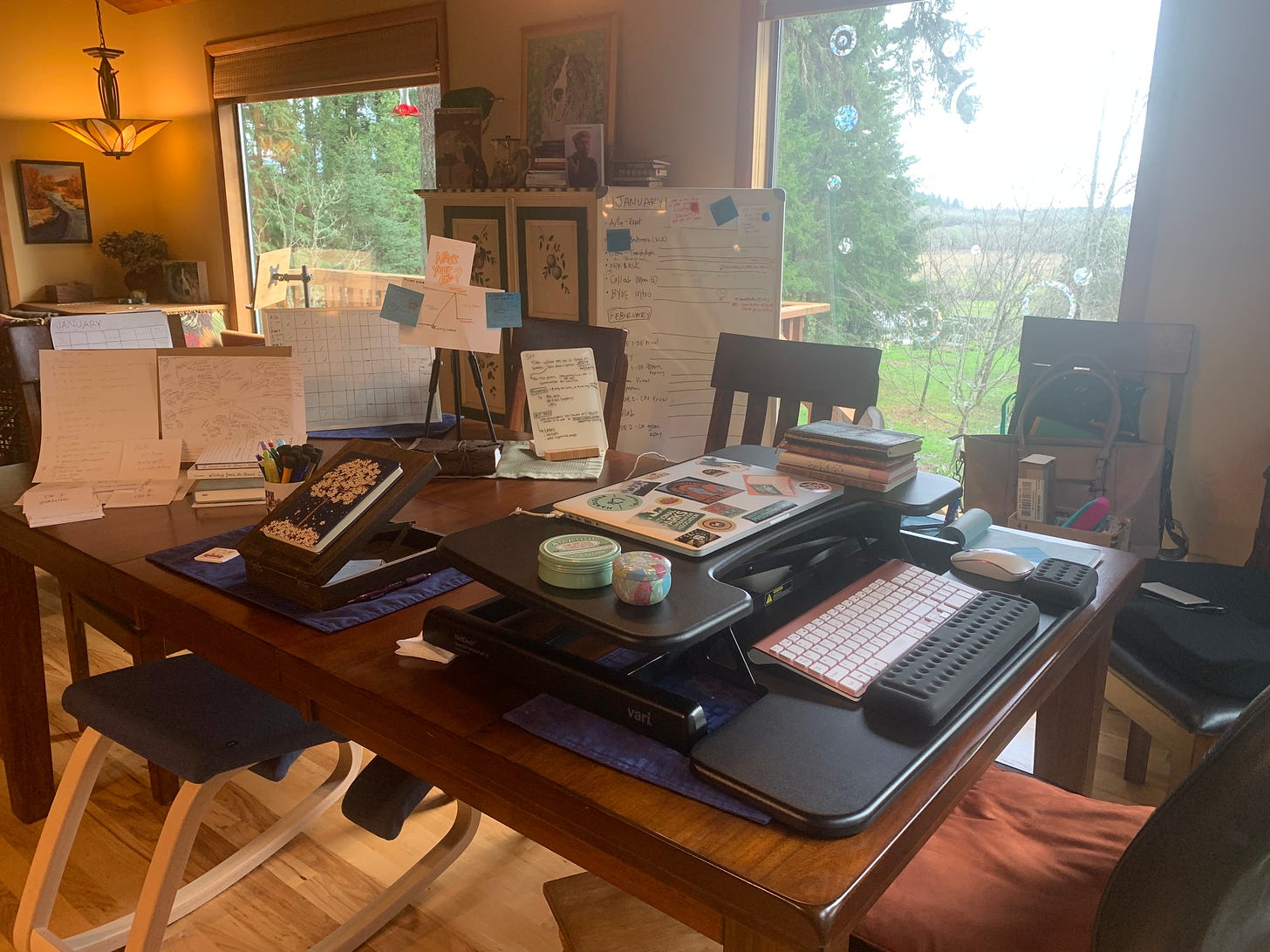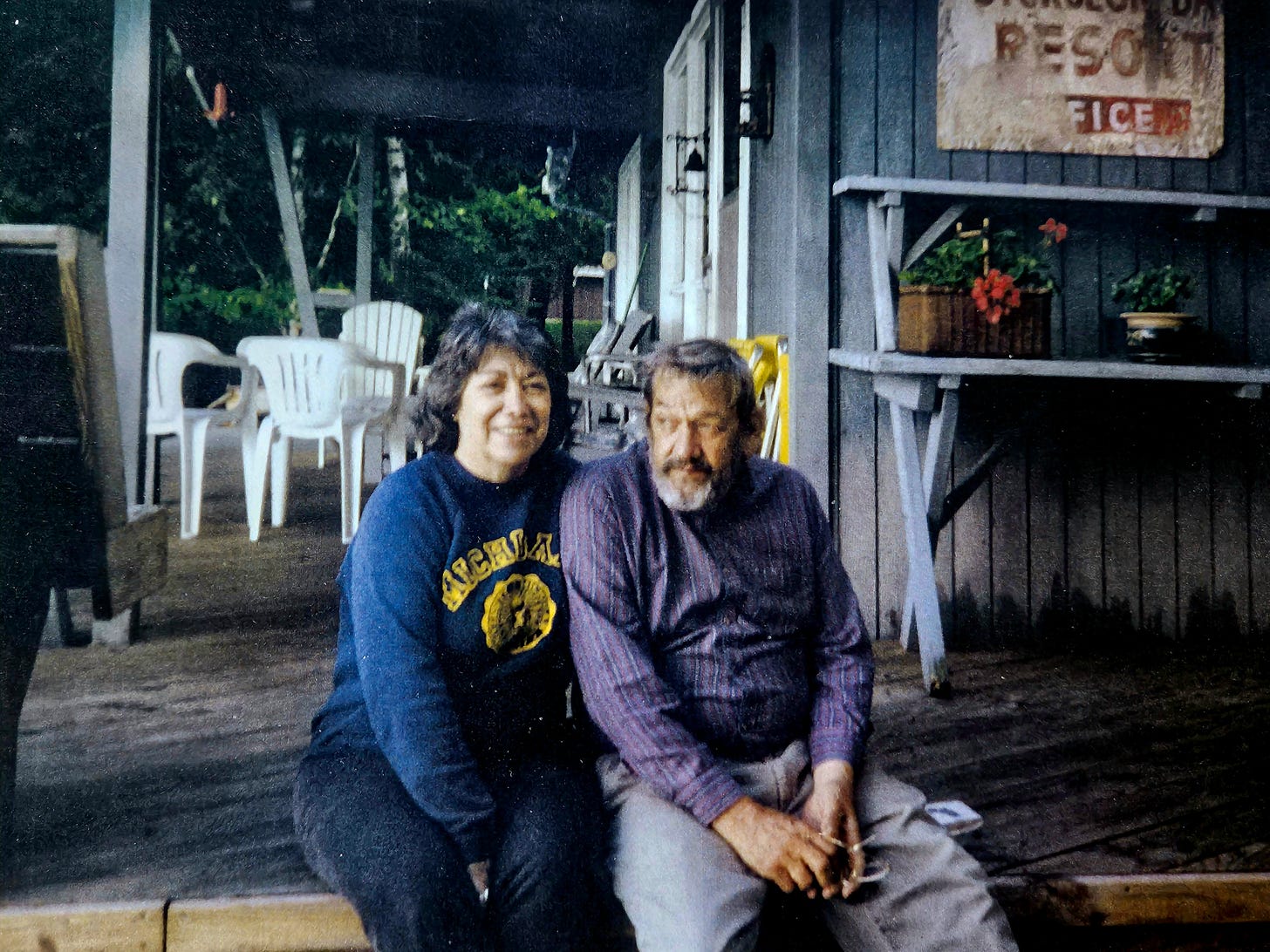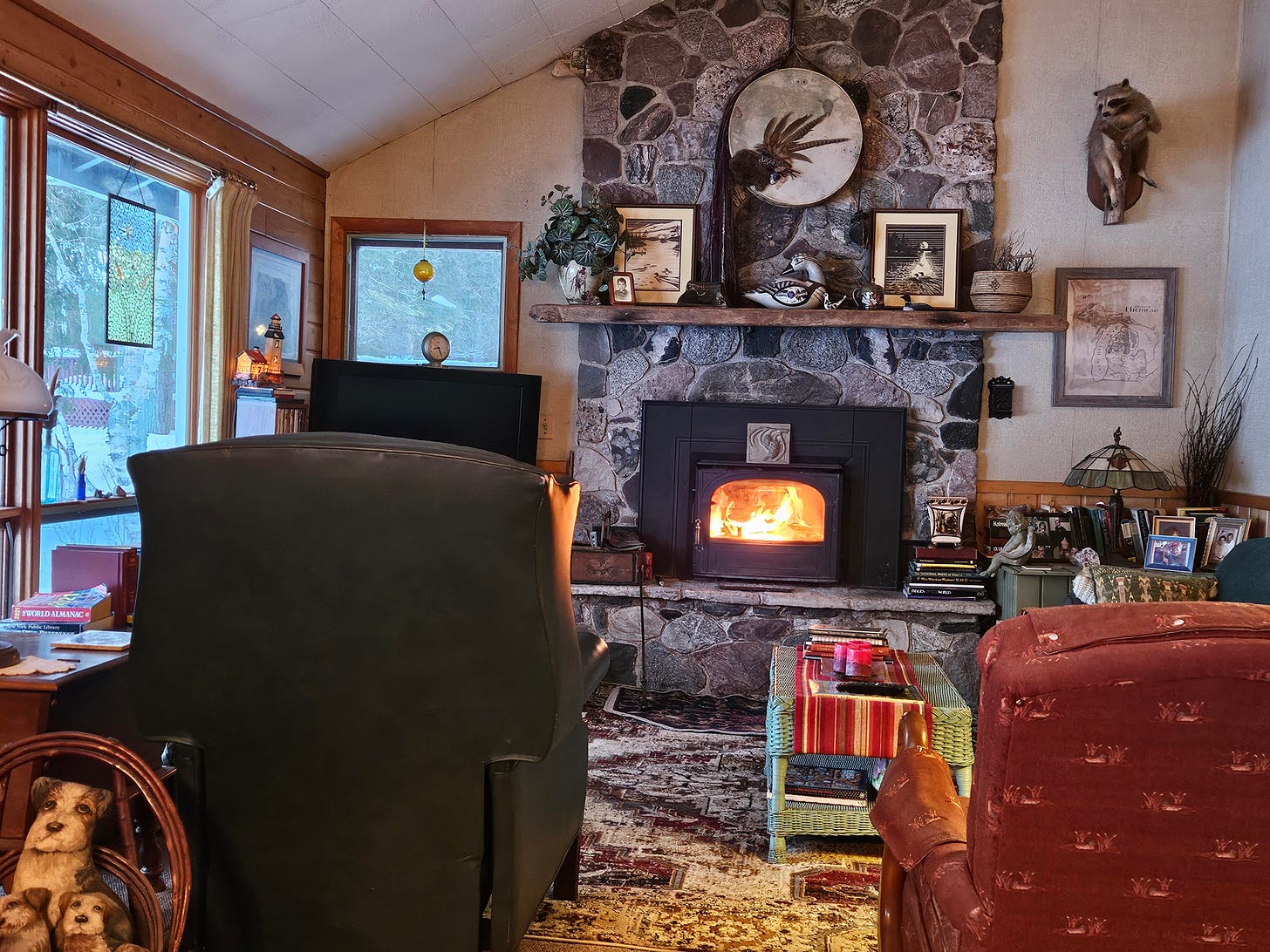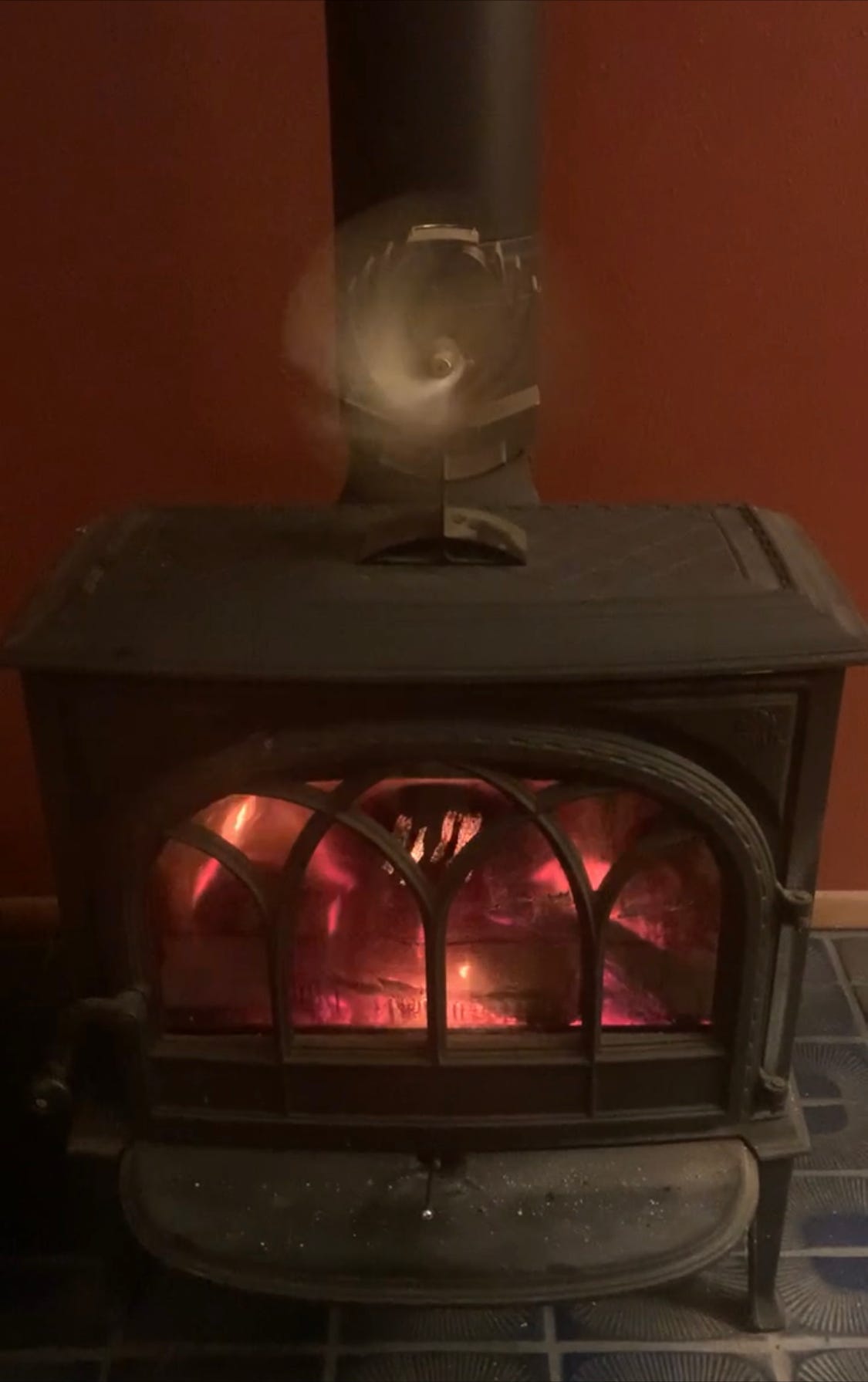5X5: Holly Starley and Ramona Grigg Talk About Our Personal Writing, Our Joys, Our Losses, and Our Winter Cabins in the Woods. Part 1.
When
, van vagabond and writer extraordinaire, invited me to engage in an online conversation about our similar yet totally different lives as winter women hunkering down alone in our cabins in the woods, I jumped at the chance.What you see below is all Holly. This is her baby. She came up with the questions and the concept and she did all the grunt work. I just went along for the ride—and what a ride it was!
She asked me five questions and I asked her five questions, (hence the 5X5) but honestly, I could have carried this on forever. As it was, I found two questions later that I’d forgotten to ask! Darn it!
Holly is such a brilliant writer. She sees things that I would have missed, and she catches the flavor and the nuance in ways that are often just breathtaking. She believes, as I do, that the best stories come almost serendipitously, and all you have to do is pay attention. They’ll show themselves. Not exactly seat-of-the-pants, but close enough.
She usually lives in her van, Ruby van Jangles, but this year she decided to winter in a cabin in beautiful Oregon. I can’t wait to open up her emails and see what she’s up to out there in those glorious woods. You’re following her, right?
So here’s Part 1. You’ll get Part 2 tomorrow, since we went a little long… We’d love to hear from you after you’ve read them. Give us your own thoughts about any of this.
And stay tuned because this is going to be a regular feature for Holly. If you can think of anyone you would like her to invite for another 5X5, just let her know. It could even be you!
First, Ramona’s Michigan island cabin
HS. I think the intention with which you’ve shared (or not) different parts of yourself is one of the reasons people are drawn to your writing and to engaging with it. You’ve written about which aspects of your life you’ve chosen to keep private and also about how that’s evolved over the years. I believe your gorgeous essay “Here’s What Being Married For 63 Years Has Taught Me About Love And Life” (HuffPost, fall 2019) was the first time you wrote publicly about your marriage to Ed. Since Ed’s passing, you’ve written about grief and depression and unexpected happiness. What has writing more personally brought to your writing life?
RG. I think finally deciding to write more personally has enriched my writing life more than I could ever have imagined. I was terrified at first. I almost pulled out of the HuffPo piece rather than resort to naming names and going into detail, as the editor insisted I must do, but I really wanted to be published there so I did it as carefully and as thoughtfully as I could. My husband, Ed, who was always my first reader but felt far more strongly about keeping our personal lives personal, had veto power over anything that might have affected him. But much to my surprise he was okay with all of it. And he was really pleased with the end result.
I was surprised at how many women could relate to that coming of age story, that ‘50s feminism story, that long marriage story, and I was really surprised at how easily they were able to tell their own stories. I felt for the first time since I’d been blogging that there was a kind of sisterhood there and I was a part of it.
But after the HuffPo piece, I didn’t do anything even near that personal again until just before Ed died. I posted a short piece when he was in hospice to let my readers know what was going on, but I shut down the comments. I knew I wouldn’t be able to deal with them. I thought that would be the end of it, but it was really the beginning. After Ed died I knew I needed to go on writing, but all I could think about was how terrible my grief felt. I wrote about it almost unconsciously at first, and when it came time to deciding whether or not to publish, I was terrified.
But I had my newsletters, I’d made a promise to my readers to keep them going, and I knew I couldn’t write about anything else. So I pushed “Publish”. The response was astonishing! Grieving people came out of the woodwork, not just giving me permission to write about my grief but asking me to please keep on doing it. So I did.
Then I realized I didn’t want my newsletter to become a grief column, and I began to open up about other aspects of my life—up north living, solitude, the beauty of simple things, ‘a day in the life of…’. It was strange, because I was still so sad, but I needed that kind of uplift myself. Now I think I’m hooked!
HS. I binged the Widow’s Walk, essays on the unwelcome, confusing, and liberating role of widowhood, each infused with the beauty of your enduring partnership. I cried. I laughed. I loved your list of possibilities. (Do try a trip by yourself; it’s marvelous!) Single, I long at times for someone to decide things with and am in awe of the difficulty of going from from sixty-five years of marriage to making decisions solo for the first time. I found myself cheering when you decided to stay in your island cottage this winter, though you and Ed had typically flown south for the season. What’s something new you’re learning in the cottage?
Well, we have a foot of snow on the ground and it’s still snowing, so I’m learning that while it’s just exquisitely beautiful, it’s also a royal pain in the ass. I’m lucky that I have three men close by who insist on watching over me. Two are neighbors, and the other is Ed’s nephew, who has debilitating health problems but feels it’s his duty to Ed to be here helping out. Right now I’ve built a fire in the woodstove because my closest neighbor—one of the three—came over and told me my propane tank is at zero. (It says 28% on the app.) And now he’s out plowing the driveway to the tank so the driver can get in there. The driver comes from off-island so it’s anyone’s guess what time he’ll be here.
So what’s something new? That I may have to rethink staying here for the entire winter. Not that I wouldn’t love to, but I hate having to rely on the kindness of people I care about who have their own problems throughout the winter. I’m paying to have my driveway and walkway plowed, but the man who does it is swamped when it gets this bad so again it’s a question of when?
Still, I’m taking tons of pictures and I find myself wandering from window to window, taking in all that wintery beauty. I’m here for the experience, aren’t I? And isn’t this the place to be for the quiet and the inspiration to write? Yes and yes. Decisions, decisions…
HS. I want to ask about a decision you made decades ago. A “full-time wife during the volatile women’s liberation era” (“Married for 63 Years”), you became a charter member of Ms. magazine by 1971. So badass! You took up the “call for equality” and shining light on abuses without disavowing the men you loved. Your marriage (and husband) evolved along with your shift in understanding. It strikes me that we’re in need of joint evolution. What one thing would you have us know about being a feminist in today’s world?
RG. I think the hardest part about being an old feminist in today’s world is seeing how little we’ve actually accomplished after so many hopeful years where what kept us going was the surety that our daughters and our granddaughters wouldn’t have to struggle for equity and equality and wouldn’t ever again have to be dismissed as ‘lesser than’.
Hillary Clinton’s presidential loss nearly broke me. I cried the night Trump ‘won’ and I could barely get out of bed the next morning. I was so sure we would finally have our first female president and I was excited that it was going to be Hillary. We were going to be all right. We’d never have to hear from Donald Trump ever again. Here was our chance to finally cement into law those things we needed to ensure not just our equality, but everyone’s. Every minority. Every poor person. Every sick person.
Well, you know what happened. But a couple of weeks before the election I found out I had breast cancer. I went through a mess of tests, and was told I would need a radical mastectomy. In a strange way, it helped that I could sometimes forget about my cancer problems by escalating my hatred for Trump.
But it’s interesting to me now to look back on the posts I wrote for my political blog, Ramona’s Voices, around that time. Granted, it was a political blog, but there was a real person behind it and, though I wrote it all in first person, in an easy, conversational tone, I never talked about my personal life. Not until a week after my surgery the following February, when I did open up a bit, but even then I turned it into a general piece about health care and politics. I kept my personal life separate at that blog. I saw it as a political vehicle and only rarely went in another direction.
So when I started what would be Constant Commoner at Substack, and later, Writer Everlasting, I wasn’t prepared to get personal. I had to kind of tiptoe into it. Now it’s a part of who I am as a writer and it feels right.
If it didn’t I wouldn’t do it.
HG. I’m glad it does feel right and that your breast cancer surgery went well. And I’m grateful for the generosity of the questions you asked me.
And so, to my cabin in Oregon
RG. You’ve rented a cabin in the woods this winter. That makes us soulmates! Will it be real winter there, with snow and everything? Or is it more the solitude you’re looking for and a cozy place to get some good writing done? Do you ever run into communications problems when you’re on the road? No phone, no internet, that sort of thing? How do you handle it?
HS. We are soulmates! That’s exactly what I thought. I read about you starting a fire right after my first, slightly successful attempt at wood chopping. It warmed my heart to think of us sharing this endeavor.
I didn’t think it would be real winter with snow. I’m in Oregon’s Willamette Valley. So, I expected more rain than I love (or, I should say, than Ruby loves—she has a leaky rain gutter despite my “brilliant” rebuilds with steel epoxy). But an ice storm and a low of 16°F the other day made short shrift of that thought. And yes, I’m here for a cozy writing retreat. Vanlife requires a lot of moving and adjusting. Where will I sleep next? When will I resupply? What adventure calls out the window? All good for the soul but less so for the practice of serious writing.
Communication problems have occurred. During the pandemic, I hosted a family Zoom gathering and needed WiFi. So, I parked outside a closed park in Southern California. I was concerned the party would be interrupted by a police officer. But no. I stayed the whole night. I have a GPS device for emergencies that also converts my phone to a satellite. So, when I’m entirely off the grid, I can check in with my sister (who disseminates the information among loved ones and tracks my phone like she does her teens’, fabulous mama that she is).
RG. Your descriptions are just insanely good. They range from broad scope to delicious minutia and they read like poetry. I envy that. It’s an art as well as a true skill, and not many can pull it off without sounding pretentious or derivative. This, for example, from your piece called ‘Suddenly, Not Alone’, describing your encounter with an elk cow along a path you both had decided to take:
“We are two creatures melded. Each takes in air the other expels. A welling up of something like longing surges from belly to throat. Show me, it would say if it had voice, everything. As if she could transfer to me the feel of summer’s white rays caressing rump high above alpine treeline, the way spongy tundra floor becomes a memory when wind speaks of snow once more and presses the journey to forest below, the satisfaction of yanking a woody morsel lodged in frozen crystal. How long before the salt melts on the tongue does a mineral lick float up the nostrils like a tantalizing allure from faraway sea?”
OMG! I couldn’t have written that in a million years. It’s sighing material. That, and every other part of that essay, along with so many others of yours. So to my questions: How long do you work on pieces like that—those pieces that tell a story of your journey yet build into something that requires deep thought about what you’re seeing out there? Do you think you would write that same way if you weren’t in your van, away from people and from crowds? Is this kind of writing new to you since you began vagabonding or has it always been your style?
First, I’m soaking in this wonderful compliment, especially from a writer I admire. Thank you. (I’m getting better at accepting compliments.) That piece took many drafts—I don’t know, ten? For me, the longer the lead time between drafts and further drafts and publication, the better. I also take wisdom from masters. I wanted to write a vignette. For this piece, I read a great piece on vignettes by Summer Brennan.
. I thought of Annie Dillard’s “Living Like Weasels” and reread it a few times. How did she work her magic?!
The van for sure gave way to lots of first or second drafting and note-taking and logging. And being out of it, in some ways, supports a robust writing practice. It’s a major part of the reason I decided to stay in the cabin for the winter. The vanlife kind of corresponded with me at last allowing myself to do what I’d always wanted—to focus on a writing career (over copywriting and editing). I had to process a great deal of doubt and fear of hurting people I love to feel OK to publish any of my work. I’ve written in notebooks since I was a girl, but I haven’t made full-throated labor of it until recently. The van started that. But I’ve cut back severely on editing and for hire work to give this a go. And I needed a place to spread out.
I sent a photo to a friend of my workspace in the cabin, and she said it’s like my inner child and adult are working in cahoots. It feels scary but right.

RG. We’ve talked a bit about our personal writing and how far we might want to go with it. When you write about your many encounters with people along the way, you seem to use their real names and you describe them in ways that tell me they are real people. Do you worry about what they might think as you write about them? Do you ask permission to use their real names and real descriptions? Are they sometimes composites? Do you sometimes change a name or a description to keep their identity private? I have a hard time with using real names and describing real people, and I often think some of the things I write involving other people must come across as phony or just too precious, considering the gyrations I go through to keep their identities secret. What’s your secret?
HS. Oh, man, I could write a tome on this. My biggest writing Achilles heel is fear of implicating / hurting others, of not getting the memory “right,” of not being generous enough with others’ perspectives. I’ve asked any memoir writer I admire and have the opportunity to engage with this question. I’ve read books on the topic. I’ve developed guidelines for myself. Loosely, they’re this: I will, in the memoir, be using fake names (often chosen by the people themselves) for every person but me. Most any writing related to that elsewhere will include those fake names. I’ll clear difficult chapters with those in them who are still breathing in this world. Generosity and emotional honesty will be my guiding principles. I’ll learn to love something about all who roam the pages of my work. I’ll admit when I’m not sure.
Changing names when writing about people on the road or people who have their own creative work they’d love people to find doesn’t work though. I plan to do an interview series with fellow roamers in a season or so. Many have online presences. I want readers to find them and support their work. If they’re identifiable in posts, I’ve checked in generally or specifically about that or know they want visibility. Otherwise, I’ll change names and details enough to obscure them.
What about you, readers? We’d love to hear from you in the comments or by email:
Where are you spending whatever season it is for you? What season is it where you are?
If you write personal memoir, what’s your strategy for naming and honoring people while maintaining emotional honesty? Or, conversely, have you ever encountered a version of yourself, identified or obscured, in someone else’s writing? What was it like?
What do you like to read or write about?
Think others will dig this exchange? Share it!







Two women on their own, writing in cabins is a gorgeous jumping off point for a conversation. On the question of how to handle other people in personal writing, I've steered away from personal writing for exactly this reason. I dabbled with a couple of parent/kid/humor essays, and enjoyed it, but I don't want to tell my kids' story on the internet before they are old enough to tell their own. It feels like a genre of writing I need to enter only occasionally, briefly, sparingly.
Wonderful idea-pairing you two. I loved reading your musings! I’ve struggled with changing names. It feels not “genuine”. But I do understand about the integrity: mine and the one about whom I am writing.
Also, I think I would need to keep a list of name changes!